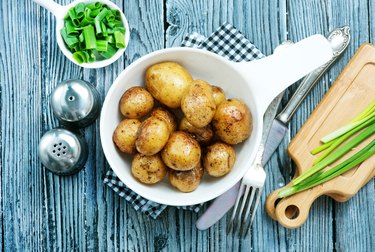
If potatoes could speak, they'd be wailing in indignation at being so misunderstood. If you're wondering whether you should be eating potatoes if you're bodybuilding, the answer is yes. Here's what you need to know about the nutritional profile of potatoes.
Tip
Potatoes are a good source of potassium and carbs, so eat them after your workout to restore your energy levels and speed up post-workout muscle repair.
Video of the Day
Video of the Day
Low-Fat Calorie Source
While you're bodybuilding, you need to consume a large number of calories per day to fuel your energy requirements and help your body build muscles. Many calorie-rich foods are also loaded with unhealthy fats, which you want to avoid. Potatoes are a good way to get in your calories, without fat or cholesterol — 100 grams of potatoes give you 58 calories, with only 0.10 grams of fat and 0 grams of cholesterol.
Of course, like with any other type of food, the way you cook them also makes a difference. Fried potatoes or potatoes loaded with butter, cheese, sour cream and bacon will have a much higher fat content than baked, roasted, grilled or boiled potatoes that have minimal oil and herbs for seasoning.
Rapid Release Carbohydrates for Energy
Potatoes are a good source of carbohydrates, which are an essential energy source for bodybuilders. They contain mainly complex, starchy carbs, as well as small quantities of simple sugars like cellulose, fructose and glucose.
Potatoes tend to get a bad rap because of their high glycemic index. The glycemic index is an indicator of how fast a certain food is converted into blood sugar. Foods with a low glycemic index tend to release glucose slowly and steadily, whereas foods with a high glycemic index tend to release glucose more rapidly.
Foods with a high glycemic index are good for bodybuilders, long-distance runners and people who have low blood sugar (hypoglycemia). Eating potatoes after your workout can give your body the glucose it needs to rapidly restore its energy levels.
You can also eat potatoes during your other meals; pairing it with other foods that are rich in protein and fiber helps bring down the rate at which it is converted to blood sugar. For example, have a helping of potatoes with a meal that has some meat, poultry, fish or eggs for protein and a vegetable salad for fiber.
Potatoes: A Nutritional Powerhouse
Potatoes are a powerhouse of several essential vitamins and minerals. They are a good source of potassium, folate and vitamin C and they also contain other nutrients like magnesium, iron, phosphorus, calcium, thiamin and niacin.
One hundred grams of potatoes give you 413 milligrams of potassium (that's more potassium than you get from 100 grams of banana!), 17 milligrams of folate and 11.4 milligrams of vitamin C.
Potassium plays a critical role in exercise; it helps your body break down glycogen in your muscle cells when you're working out. Glycogen powers your muscle cells as they contract repeatedly when you work out. This process depletes the potassium in your muscle cells, because it flows out of the muscle cells and into your bloodstream from where it is excreted via sweat or urine.
The National Institutes of Health (NIH) recommend that adult males get 3,400 milligrams of potassium per day and that adult females get 2,600 milligrams of potassium per day. However, a growing body of research is showing that we require more potassium than that, so the NIH is in the process of raising the daily value to 4,700 milligrams of potassium per day.
The NIH also notes that Americans often do not get as much potassium as they require, which is why the 2015–2020 Dietary Guidelines for Americans list potassium as a "nutrient of public health concern."
As for the other key nutrients in potatoes: Folate helps your muscles grow and repair themselves and vitamin C is a powerful antioxidant that can protect your body against exercise-induced oxidative stress. Magnesium is also a critical mineral when it comes to exercise performance, according to a September 2017 study published in the journal Nutrients.
Read more: Fruits and Vegetables Containing Folic Acid
The Verdict: Potatoes for Bodybuilding
Potatoes are often lumped in with other white carbohydrates like bread, pasta, flour and sugar that often have little or no nutritional value. But the truth is that though most of the calories from potatoes come from carbs, they're not quite the same thing.
They're not refined carbs, to begin with. Besides, all calories are not equal and the calories in potatoes are accompanied by lots of vitamins and minerals and very little fat and cholesterol, making them very nutritional calories.
Though they're not a great source of protein, like other muscle-building foods, potatoes are a moderate source of dietary fiber. They are also a very satiating food; they fill your stomach and keep you full, which can help prevent unhealthy snacking in between meals.
Overall, they're a great addition to your diet if you're bodybuilding. Watch out though; while potatoes are healthy, sometimes they're served with a lot of stuff on them that isn't super healthy.
Including Potatoes in Your Diet
Here are some healthy ways to include potatoes in your diet. You can bake them and eat them with cottage cheese, or roast them with herbs, a dash of olive oil and other veggies like carrots, bell peppers, zucchini, broccoli and onions. You can also slice them thinly or cut them into wedges and bake them, as a healthier substitute for french fries.
Read more: Why Potatoes With More Color Are Healthiest
Remember to use the potatoes with the skin on; a lot of the nutrients are concentrated either in the skin or just under it, so you don't want to lose out on them by peeling the potatoes. A lot of the fiber is also found in the skin.